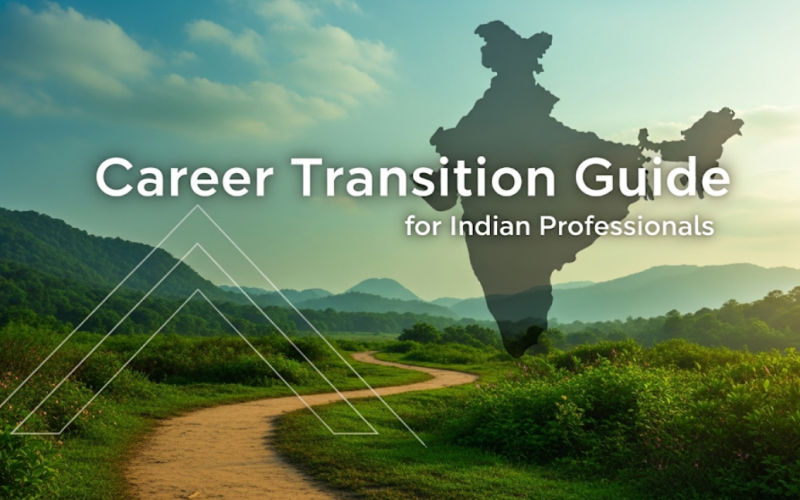Career Transition Guide for Indian Professionals: Successfully Switch Industries at Any Age

Navigate career changes successfully with expert strategies for Indian professionals.
Career transitions have become increasingly common among Indian professionals, with 80% contemplating career switches in 2023 driven by better compensation, work-life balance, and flexibility opportunities. Whether you're 25 or 45, strategic career transitions can unlock new potential and professional satisfaction.
Understanding Career Transition Landscape
Modern career paths are far from linear, with professionals changing careers multiple times throughout their working lives. Economic shifts, technological advancement, and evolving personal priorities make career transitions both necessary and achievable at various life stages.
Common Reasons for Career Changes
Professional Growth Limitations
Limited advancement opportunities, skill obsolescence due to technology changes, industry decline or instability, misalignment with personal values, and desire for meaningful work contributing to society.
Personal Life Factors
Work-life balance improvement, family responsibilities and commitments, health considerations requiring change, geographic relocation needs, and pursuit of long-delayed passions or interests.
Market-Driven Changes
Industry disruption through technology, economic downturns affecting sectors, emergence of new industries and opportunities, salary stagnation in current field, and changing market demand patterns.
Self-Assessment for Career Transition
Values and Interest Evaluation
Identify core personal values, assess genuine interests and passions, understand preferred work environment, evaluate desired impact and contribution, and consider long-term life goals.
Skills Inventory and Gap Analysis
Map transferable skills applicable across industries, identify technical skills requiring development, assess soft skills and leadership capabilities, understand learning requirements for target field, and evaluate experience relevance.
Financial and Risk Assessment
Calculate transition costs including training and reduced income, assess financial stability during transition period, understand market demand in target industry, evaluate job security and growth prospects, and plan timeline for transition completion.
Strategic Career Transition Planning
Research and Exploration Phase
Thoroughly research target industries including growth prospects, salary ranges, required qualifications, industry culture and work environment, and advancement opportunities.
Networking and Informational Interviews
Connect with professionals in target industry, attend industry events and conferences, join relevant professional associations, conduct informational interviews, and build relationships with potential mentors.
Skill Development Strategy
Identify critical skills for target role, enroll in relevant courses and certifications, gain practical experience through projects or volunteering, develop portfolio showcasing new capabilities, and obtain industry-recognized credentials.
Industry-Specific Transition Strategies
Technology Sector Entry
Focus on learning programming languages, understanding software development lifecycle, gaining experience with current technologies, building technical portfolio, and obtaining relevant certifications like AWS, Google Cloud, or specific programming credentials.
Finance and Banking Transitions
Develop financial modeling skills, understand regulatory environment, gain knowledge of financial instruments, obtain certifications like CFA, FRM, or CA, and understand risk management principles.
Healthcare Industry Entry
Understand healthcare regulations and compliance, develop knowledge of medical systems and processes, gain experience in healthcare technology, obtain relevant certifications, and understand patient care principles.
Consulting and Strategy Roles
Develop analytical and problem-solving skills, learn framework approaches to business problems, understand various industries and business models, improve presentation and communication skills, and gain experience in client management.
Age-Specific Transition Considerations
Career Changes in 20s-30s
Take advantage of learning agility and adaptability, leverage energy and enthusiasm for new challenges, build diverse skill sets early, take calculated risks for higher rewards, and establish professional networks across industries.
Mid-Career Transitions (35-45)
Leverage extensive experience and professional networks, focus on leadership and management transitions, consider entrepreneurial opportunities, balance family responsibilities with career goals, and utilize accumulated resources for transition support.
Later Career Changes (45+)
Leverage wisdom and deep expertise, consider consulting or advisory roles, focus on meaningful work and legacy building, utilize extensive networks and relationships, and consider gradual transition approaches.
Overcoming Transition Challenges
Financial Constraints
Plan transition budget including reduced income periods, maintain emergency funds for security, consider part-time or contract work during transition, explore education financing options, and negotiate timeline with current employer if possible.
Lack of Industry Experience
Gain experience through volunteering, internships, or project work, leverage transferable skills and experiences, obtain industry certifications and training, network extensively within target industry, and consider entry-level positions for experience.
Age Discrimination Concerns
Focus on value proposition and unique experience, stay current with technology and industry trends, maintain professional appearance and energy, network effectively to access hidden job markets, and consider smaller companies more open to diverse experience.
Transition Timeline and Milestones
Preparation Phase (3-6 months)
Complete self-assessment and research, develop transition plan, begin skill development, start networking activities, and prepare finances for transition.
Active Transition (6-18 months)
Intensify job search activities, complete education and certification programs, gain practical experience through projects, interview for target roles, and maintain current job performance during transition.
Integration Phase (3-6 months)
Successfully onboard into new role, establish credibility and relationships, continue learning and skill development, assess progress against goals, and plan next career steps.
Leveraging Professional Support
Career Coaching Services
Work with career counselors for structured guidance, utilize assessment tools for clarity, develop transition strategies with professionals, gain accountability and support, and access industry insights and connections.
Government and Industry Support
Utilize Skill India programs for retraining, access National Skill Development Corporation resources, explore industry-specific training programs, consider educational loan facilities, and leverage networking opportunities through professional associations.
Success Factors for Career Transitions
Maintain clear vision and goals, develop relevant skills proactively, network strategically within target industry, remain flexible and adaptable, persist through challenges and setbacks, and celebrate small wins along the journey.
Career transitions require courage, planning, and persistence, but they offer opportunities for professional growth, personal fulfillment, and increased earnings potential. With strategic approaches and platforms like Jobsfiy connecting professionals with diverse opportunities, successful career changes are achievable at any stage of professional life.
- Share This Job











Write A Comment
No Comments